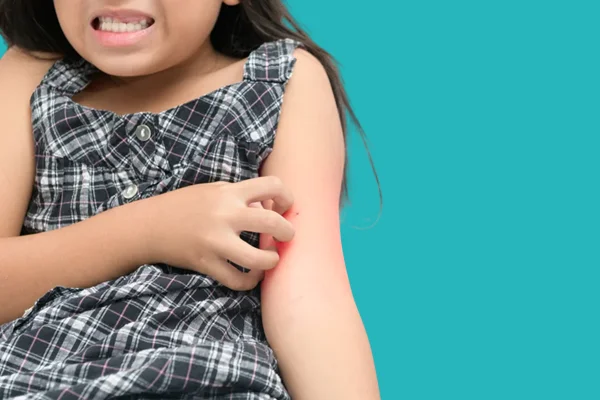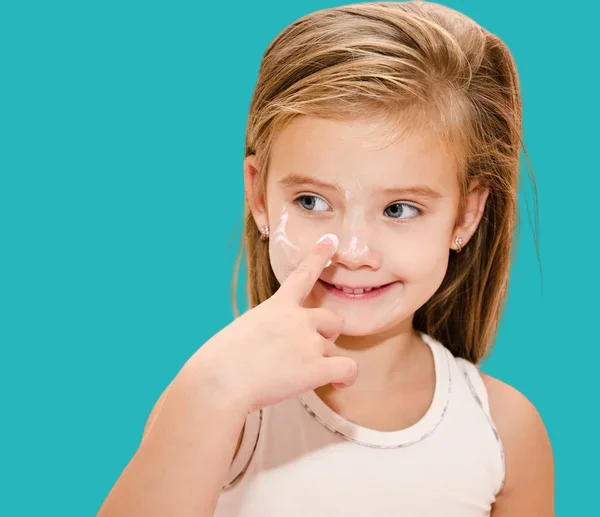Eczema in children is a skin condition that causes inflammation, itching, and dryness of the skin, as well as the formation of scales over sores and wounds, which may disappear with continuous moisturizing.
Although it is not contagious, it can last for a long time and become chronic, and the child may develop complications if it is not properly treated.
What is eczema in children
Eczema is a skin inflammation that affects children, causing dry skin and the appearance of red, scaly patches accompanied by itching. It may appear on the hands, cheeks, or behind the knees and elbows.
Eczema may disappear and reappear due to a weakened skin barrier and resolves when the skin is continuously moisturized and skin irritants such as perfumes and soaps are avoided.
Causes of eczema in children
Eczema in children occurs due to several reasons, including:
- Dry skin.
- Excessive sweating.
- Genetic factors.
- Weakened immune system.
- Psychological stress in the child.
- Skin irritation due to certain types of fabrics.
Symptoms of eczema in children

The symptoms of eczema in children appear to varying degrees depending on the severity of the disease and the location of the rash, and include:
- Dry skin.
- Severe itching.
- Cracked skin.
- Rough, scaly patches.
- Skin inflammation and redness.
- Appearance of scales on sores.
How is eczema in children diagnosed
The dermatologist diagnoses eczema in children by carefully examining the affected child's skin and reviewing the family history of asthma, allergic rhinitis, and eczema.
Then, they determine the cause of the skin irritation, whether it is dust, a type of food such as milk or eggs, or a product the child uses on their skin, such as soap or perfume.
Treatment Methods for Eczema in Children
There are many ways to treat eczema in children, but they all aim to soothe skin inflammation and relieve symptoms, including:
- Phototherapy.
- Antihistamine medications.
- Avoiding skin irritants.
- Using antibiotics.
- Using moisturizing creams daily.
- Creams containing corticosteroids.
Medications Used to Treat Eczema in Children
Medications are used under the supervision of a doctor to determine the appropriate type and dosage for each case. These medications include:
- Elidel.
- Betnovate.
- Protopic.
- QV Cream.
- Fexofenadine.
- Fucidin cream.
Potential Complications of Eczema in Children
A child may develop some complications from eczema if it is not treated properly, including:
Skin discoloration.
Sleep disturbances.
Chronic itching.
Infection due to severe itching.
How to Prevent Eczema in Children

Eczema in children can be prevented by regularly moisturizing the child's skin, avoiding any perfumes or soaps that irritate the skin, and choosing soft cotton clothing for the child.
In addition, bathing with lukewarm water is recommended, as hot water causes skin dryness. Regular follow-up with a dermatologist is also important to prevent the recurrence of eczema and to minimize its symptoms as much as possible.
Frequently Asked Questions about Eczema in Children
When does eczema end in children
Eczema usually resolves as the child gets older, but in some cases, it may persist into puberty and adolescence.
What are the types of eczema in children
There are many types of eczema, including atopic, seborrheic, dry, neurodermatitis, and contact dermatitis.
Does eczema return in children after treatment
Yes, eczema may return after treatment because it is a chronic skin condition.
Is eczema in children an autoimmune disease
Yes, eczema can affect a child due to a weakened skin barrier and an exaggerated response to environmental irritants.
Article Summary
Eczema in children is a chronic skin inflammation that causes several symptoms such as dry skin, scaling, and severe itching. It can be prevented by consistently moisturizing the skin.
Eczema occurs as a result of a weakened immune system in the child or due to the skin's exposure to environmental irritants that contribute to the appearance of eczema. It may also be due to a family history of the condition.